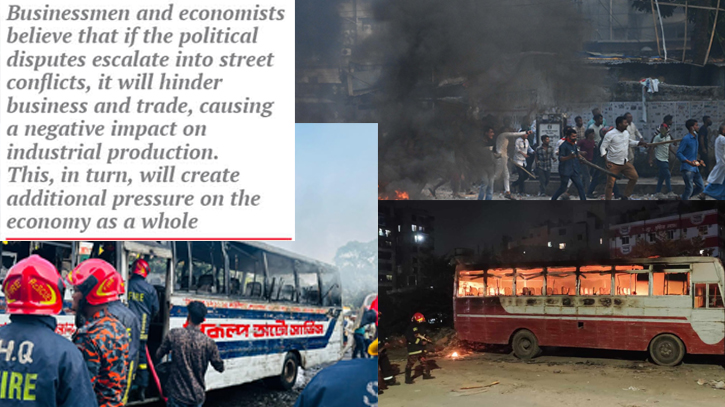
Businessmen and economists believe that if the political disputes escalate into street conflicts, it will hinder business and trade, causing a negative impact on industrial production. This, in turn, will create additional pressure on the economy as a whole.
As the 12th National Parliament election draws near, political tensions have escalated within the realm of politics. This resurgence of conflict has reignited concerns over the specter of political instability, which looms large amid a global economic crisis.
Businessmen and economists believe that if the political disputes escalate into street conflicts, it will hinder business and trade, causing a negative impact on industrial production. This, in turn, will create additional pressure on the economy as a whole.
Businessmen have pointed out that the country's economy has been under internal and international pressure for over a year. They cite challenging issues in the domestic economy, such as a dollar crisis, high inflation, declining remittance income, and slow investment. Furthermore, they highlight the impact of international crises, including the Russia-Ukraine war and the recent Israeli invasion of Palestine.
In such a situation, if the internal crisis combines with international crises, it will significantly affect the overall economy, including industrial production and business activities. Disruption in the supply chain within the country will lead to increased prices of goods in the market and disruptions in industrial production. As a result, products supplied from Bangladesh to the world market will also be affected, and global buyers may seek alternative sources if the crisis deepens.
Economists said that business and trade managed to recover after facing the shock of the coronavirus epidemic, but they now have to contend with multiple domestic and global hurdles. The dollar crisis has reached its peak, and high inflation is putting pressure on the general population.
Mahbubul Alam, the President of FBCCI, expressed his concerns regarding the significant impact of the current situation on our economy. He said, “If factories do not function effectively, it will impede import and export activities, disrupt the supply chain, and adversely affect the general population. Additionally, our international image will suffer as a consequence.”
He further said, “Everyone engages in politics for the betterment of the country. Therefore, if that is the case, one should consider organising political programmes while avoiding actions that harm the common people, businesses, and trade.”
Meanwhile, Syed Mahbubur Rahman, former chairman of the Association of Bankers, Bangladesh (ABB), and managing director of Mutual Trust Bank, expresses concerns about the extensive impact of political unrest on the banking sector, already under pressure from defaulted loans.
He mentioned that Bangladesh has been successful in its economic recovery process following the Covid-19 pandemic. However, since July of last year, this positive trajectory has taken a downturn.
He also pointed out that the value of currency is steadily decreasing due to competitive exchange rates. To curb further inflation, interest rates must be raised, which has created pressure on the banking sector. Moreover, political programmes like hartal-blockade are expected to reduce people's spending, leading to a decrease in cash flow and an increase in defaulted loans. In this time of liquidity crisis, a rise in defaulted loans could make the situation for banks even more fragile.
"We believe that we need a fair election without any conflicts. Regardless of which government comes to power, a stable government is essential. This is the expectation of all political parties,” he added.
The entrepreneurs of the garment sector, which is crucial for the country's exports, are also worried. Exports have already stumbled in October, and if the political unrest continues, they fear that the export industry will suffer further.
Mohammad Ali Khokon, President of the Bangladesh Textile Mills Association (BTMA), told the Daily Messenger, “If political unrest escalates and strikes turn violent, it will primarily harm businesses and industries. Our goods transportation and communication systems will be adversely affected. We urge both political parties to avoid engaging in such inflammatory programmes.”
Faruq Hasan, President of BGMEA, an association representing ready-made garments exporters, told the Daily Messenger, “The global situation is unfavourable. Buyer demand is decreasing, and if there is instability in the country, the export-oriented industry will face a crisis. At such times, political stability is essential. In case of instability, buyers will seek alternatives, intensifying the pressure on the economy.
In this regard, Ahsan H Mansur, Executive Director of the Policy Research Institute (PRI), a private research organization, expressed his views, “This situation is a failure for Bangladesh, particularly among the politicians. During election periods, instability prevails, which has a significant cost for the entire nation. This time too, conflicts have arisen, resulting in a massive economic impact. The economic situation is relatively fragile compared to other times, and the global situation is unfavourable.
Somehow the situation has to be improved; it has to be done through the political parties. Otherwise, the country will suffer, along with the economy and the common people,” added Ahsan H Mansur.
Messenger/Disha








